The New European Council President Donald Tusk Is a Fighter against Hopelessness and Monotony
Adelina Marini, December 10, 2014
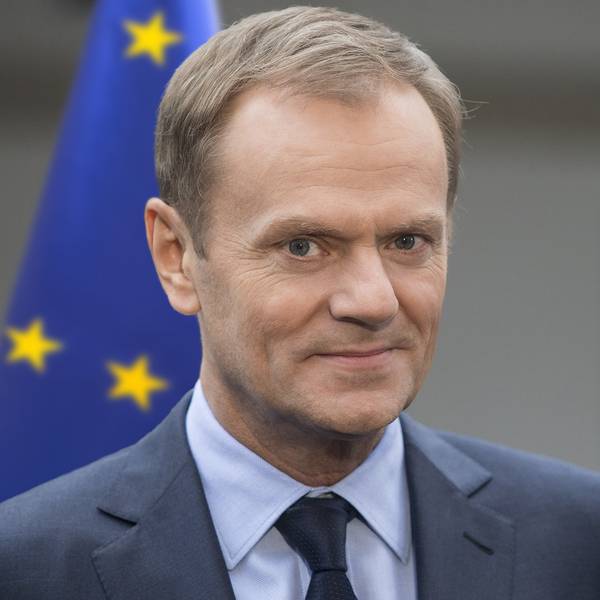 The first week of change in EU is already a fact. As of 1 December, at the helm of the European Council - the most powerful and policy-defining body in the EU - has stood Donald Tusk, the former prime minister of Poland. His very first activities set the tone of a significant change of the post, held until recently by the very contained, cautious and subtle former prime minster of Belgium Herman Van Rompuy, who became popular in the beginning with his passion for haiku. Mr Rompuy, often called by journalists "the Mouse" because of the associative form of his head, was the first European president after the entry into force of the Lisbon Treaty which put an end to the rotating presidencies at the highest level by creating a permanent chairman of the summits of the leaders of the member states. After the euro area debt crisis broke up, the powers of the European president, quite naturally, spread over to the summits of the countries that share the common currency.
The first week of change in EU is already a fact. As of 1 December, at the helm of the European Council - the most powerful and policy-defining body in the EU - has stood Donald Tusk, the former prime minister of Poland. His very first activities set the tone of a significant change of the post, held until recently by the very contained, cautious and subtle former prime minster of Belgium Herman Van Rompuy, who became popular in the beginning with his passion for haiku. Mr Rompuy, often called by journalists "the Mouse" because of the associative form of his head, was the first European president after the entry into force of the Lisbon Treaty which put an end to the rotating presidencies at the highest level by creating a permanent chairman of the summits of the leaders of the member states. After the euro area debt crisis broke up, the powers of the European president, quite naturally, spread over to the summits of the countries that share the common currency.
It was in those most difficult moments when the EU was reforming its economic governance and when all night-long summits took place in a race with the moods of the markets that Herman Van Rompuy's inherent containment played a role. He rarely deviated from the preliminary coordinated statements no matter how stubbornly he was provoked by the media. Still, he had several deviations from the scenario worth remembering. Donald Tusk is different. And the time he steps in is also different. The new policy requires not to follow the events but to anticipate them. Tusk has shown that he is different even during the handover ceremony in Brussels when after Herman Van Rompuy carefully read out his welcoming speech, which was in the same time a farewell speech, Mr Tusk spoke without a piece of paper in his hands.
He did not shy to reveal his uneasiness and to criticise his own timid attempts to say something in French. And although he is just a beginner in French, in terms of the English language he demonstrated that he sticks to his promises. Around his election he was heavily criticised for his bad knowledge of English but he promised that by 1 December he would "polish" his English. And he did it.
When Herman Van Rompuy was elected in a completely different geopolitical situation, he rather disappointed because he was an illustration of the then dominant tradition the European leaders to be strong in words but when it comes to action to try and circumvent the agreements. With the second president in a row we have a chance to get precisely what some wanted of the Lisbon Treaty - a strong political figure who will not be afraid to state a position without having to consult it in advance with all the member states. Of course, the European president cannot act on his/her own, but there are issues that he/she should be ready to react on much before he or she was forced to and without having to coordinate his/her words with the 28 capitals.
Donald Tusk's first words show precisely where he will not need a multinational prompting. And his election, which happened under the insistence of Chancellor Angela Merkel, prove that this time the president was elected with a specific term. "I come here with a strong sense of purpose. In these difficult times Europe needs success. And success for Europe, in the coming years, means in my opinion four things", Tusk said. As first he put the protection of the European fundamental values which, according to him, are: solidarity, freedom, unity against the threats to the Union and its unity coming from both inside and outside. A very strong message aimed at the eurosceptic, nationalistic and xenophobic forces in Europe and at Russia, which Donald Tusk called in his first big interview for The Financial Times "a strategic problem" for Europe.
Secondly, Donald Tusk put the "ruthless determination to end the economic crisis". Among his priorities is also the completion of the "genuine" Economic and Monetary Union (the eurozone), of which he recalled that it is an advantage not a disadvantage. The third central topic of his presidency will be to turn the EU into a strong power internationally. On the fourth place he put the relations between Europe and USA which he called "the backbone of the community of democracies". It is no accident that his first telephone conversation after his taking over the presidency was with President Barack Obama. "That the phone call takes place on my first day in office as President of the European Council underlines the importance I attach to our relations with the US".
Mr Tusk put a special focus in his statement after his conversation with Mr Obama on the negotiations on a trade agreement with the US, which is a subject of severe criticism and strong controversy in the EU reflecting the growingly tense geopolitical situation that has turned again into a clash between the US and Russia. "The TTIP is not just about free trade; it is an expression of our geopolitical partnership", said the former Polish premier who, during his 7-year long governance, turned Poland into a leading and non-ignorable factor in the European domestic and external policy. Those are some of the toughest negotiations on a trade agreement so far and although Donald Tusk has positioned himself as a strong American ally, this will not help much. One thing is certain, though, that he will inject a strong dose of energy into the too protocolistic EU-US summits.
In the very beginning of his term, Donald Tusk held a telephone conversation with Ukraine's President Petro Poroshenko as well. While Tusk was a prime minister, Poland was a motor of the search of a strong European support for the pro-European rebellion of Ukraine together with the Baltic states. There was an intensive talk around his election that this was one of the reasons why Angela Merkel insisted that he took the post from Herman Van Rompuy, although Poland is not a member of the euro area which his critics underscored could prove a problem. In his very first working week, though, he had a long meeting with Mario Draghi, the European Central Bank chief. Donald Tusk's relationship with Ms 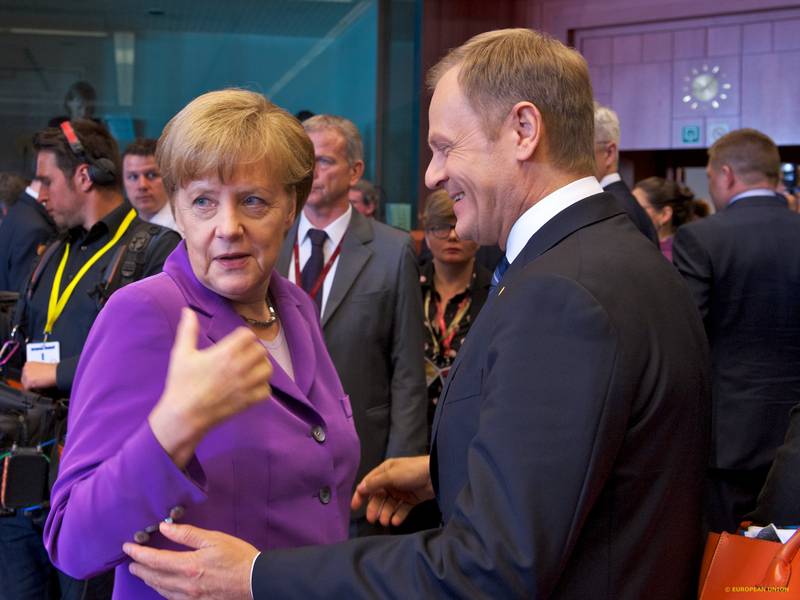 Merkel has never entered the spotlight contrary to her relationship with President Putin or the former French head of state Nicolas Sarkozy.
Merkel has never entered the spotlight contrary to her relationship with President Putin or the former French head of state Nicolas Sarkozy.
Donald Tusk spoke about her with a very personal emotion, saying that they both originate from one place - Danzig (Gdansk). According to Tusk, Ms Merkel's grandfather was a senator in Gdansk during the time when his grandfather lived there too. "If we can talk of friendship in politics, and especially in diplomacy, then I think we can say this is a deep and unique friendship". Both are also connected by the specific for Eastern Europe understanding of the region because Angela Merkel comes from Eastern Germany.
The new chief of the European Council, in the first days of his term, spoke on the phone also with Chinese President Xi Jinping, with whom he discussed the situation in Ukraine, too. Generally, Ukraine was a central topic in Donald Tusk's first working week which proves the expectations that through him the EU will more often articulate clear and firm positions on Ukraine and Russia. On his calendar in his first working days were also meetings with leaders of EU member states. The order of meetings also suggests the priorities. Among the first were Finland's Prime Minster Alexander Stubb, Latvia's Laimdota Straujuma and NATO's secretary general Jens Soltenberg in one day. And on the next, he met Bulgaria's PM Boyko Borissov - a meeting that had a huge geopolitical meaning.
When handing over the bell, Herman Van Rompuy underscored that the presidency was going into the hands of a leader of a country which was on the other side of the Iron Curtain. Hardly at this stage there can be a more appropriate biography for this post. Donald Tusk was an activist against the communist regime and a former journalist. In his interview with The Financial Times he says that the biggest problem of life during communism was not the terror or poverty but monotony. "What we suffered from was the monotony, the boredom. No hope for anything to change. To break this monotony was the desire, the temptation". Certainly, the EU summits will no longer be monotonous or boring. Not 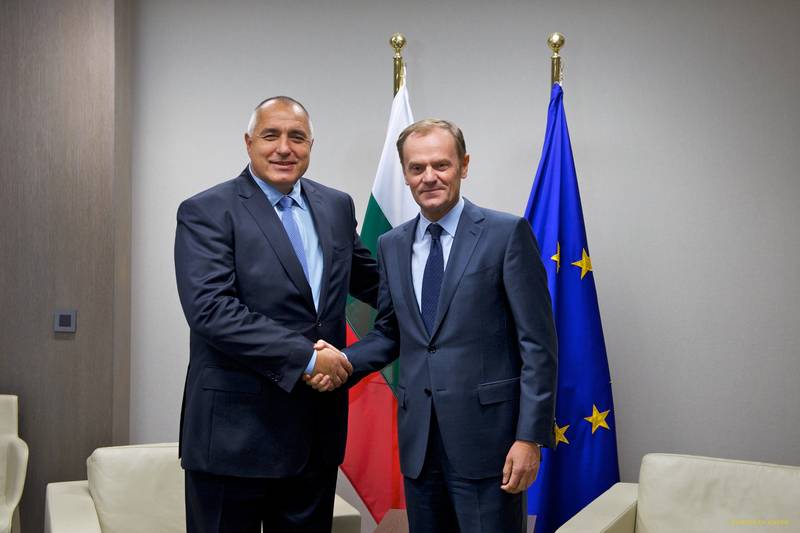 only because of the geopolitical situation but also because of the new president. His first test will be on 18-19 December when the year-end summit will take place with a very busy agenda.
only because of the geopolitical situation but also because of the new president. His first test will be on 18-19 December when the year-end summit will take place with a very busy agenda.
The leaders will discuss Juncker's investment plan, the new euro area road map, the situation in Ukraine and the relations with Russia. Inevitably, there will be some talk about the big geopolitical surprise - the suspension of the construction of South Stream. As the tradition goes, this is the summit when the leaders assess the progress of enlargement. However, the context now is different - the new Commission has a different view about enlargement, but the member states insist on a change, especially when it comes to problematic states like Bosnia and Herzegovina. Donald Tusk will have to handle all this, including the ever more tangible change of the EU's economic policy - from literalism in applying the fiscal rules toward a cautious interpretation that would create a difficult balance - not killing the efforts for reforms while in the same time boosting the investment moods in the EU. Donald Tusk was a prime minister of the only EU country which avoided recession in the years after the crisis broke out and which overcame the drop of investments by turning the EU funds into a major source for investments. The expectations of the new president are very high and he knows it. But if he is successful, this would radically change the way the candidates are selected for this post.
 Federica Mogherini | © Council of the EU
Federica Mogherini | © Council of the EU | © Council of the EU
| © Council of the EU Luis De Guindos | © Council of the EU
Luis De Guindos | © Council of the EU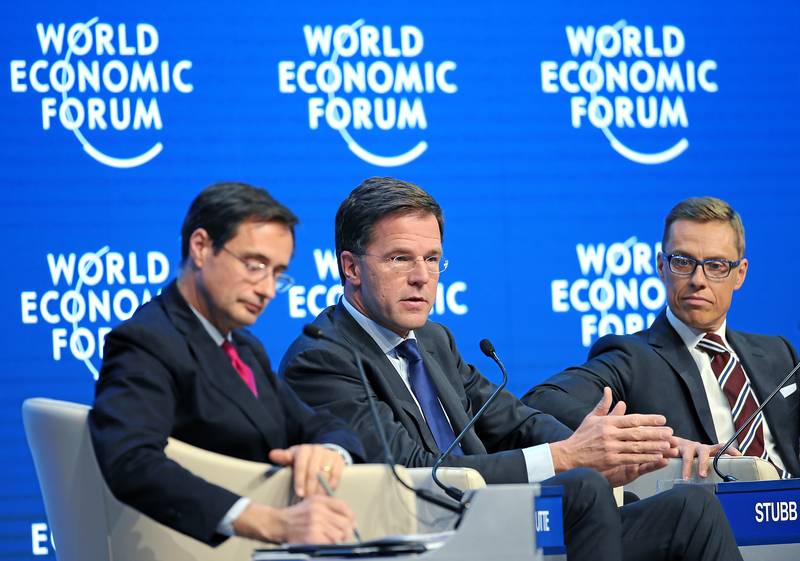 Mark Rutte, Alexander Stubb | © WEF
Mark Rutte, Alexander Stubb | © WEF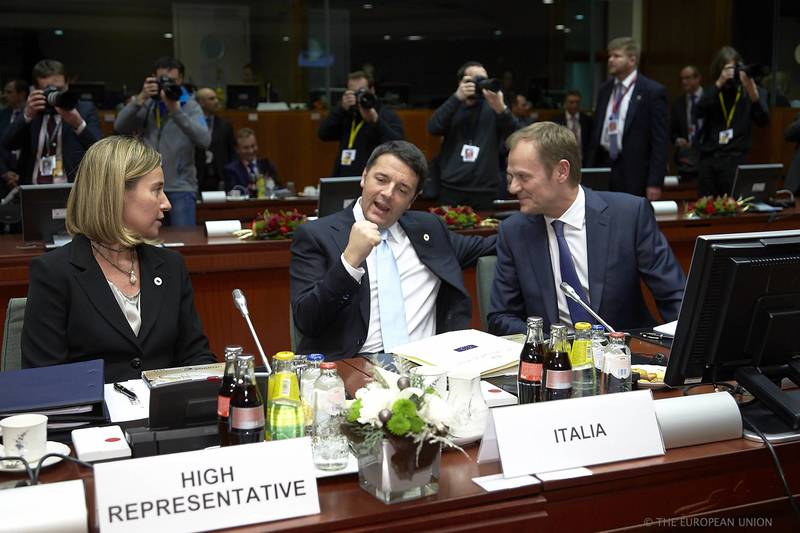 Mogherini, Renzi, Tusk | © European Council
Mogherini, Renzi, Tusk | © European Council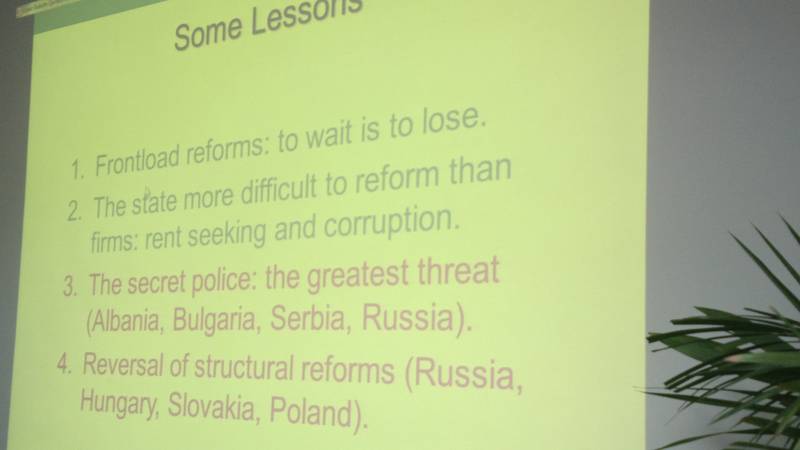 | © euinside
| © euinside